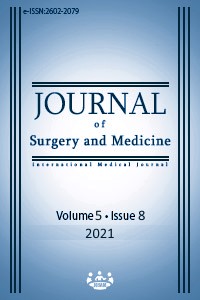Abstract
References
- 1. Bhanji F, Finn JC, Lockey A, Monsieurs K, Frengley R, Iwami T, et al. Part 8: Education, Implementation, and Teams: 2015 International Consensus on Cardiopulmonary Resuscitation and Emergency Cardiovascular Care Science With Treatment Recommendations. (1524-4539 (Electronic)).
- 2. Greif R, Lockey AS, Conaghan P, Lippert A, De Vries W, Monsieurs KG. European Resuscitation Council Guidelines for Resuscitation 2015: Section 10. Education and implementation of resuscitation. (1873-1570 (Electronic)).
- 3. Yalçınoğlu N, Kayı İ, Işık Ş, Aydın T, Zengin Ş, Karabey S. İstanbul Üniversitesi Tıp Fakültesi Son Sınıf Öğrencilerinin Tıp Eğitimi İle İlgili Görüşleri. İstanbul Tıp Fakültesi Dergisi. 2013;75(3):41-5.
- 4. Günay O. Erciyes Üniversitesi Tıp Fakültesi Son Sınıf Öğrencilerinin Tıp Eğitimi Hakkındaki Düşünceleri. Tıp Eğitimi Dünyası. 2002(7):49-55.
- 5. Bonnetain E, Boucheix JM, Hamet M, Freysz M. Benefits of computer screen-based simulation in learning cardiac arrest procedures. Med Educ. 2010;44(7):716-22.
- 6. Tan GM, Ti LK, Tan K, Lee T. A comparison of screen-based simulation and conventional lectures for undergraduate teaching of crisis management. Anaesth Intensive Care. 2008;36(4):565-9.
- 7. Schwid HA, Rooke GA, Michalowski P, Ross BK. Screen-based anesthesia simulation with debriefing improves performance in a mannequin-based anesthesia simulator. Teach Learn Med. 2001;13(2):92-6.
- 8. Davis J, Crabb S, Rogers E, Zamora J, Khan K. Computer-based teaching is as good as face-to-face lecture-based teaching of evidence based medicine: a randomized controlled trial. Med Teach. 2008;30(3):302-7.
- 9. Biese KJ, Moro-Sutherland D, Furberg RD, Downing B, Glickman L, Murphy A, et al. Using screen-based simulation to improve performance during pediatric resuscitation. Acad Emerg Med. 2009;16 Suppl 2:S71-5.
An alternative educational method: Computer-based simulation program for advanced cardiac life support education
Abstract
Background/Aim: Technology is gaining importance in medical education, along with distance learning and technology-enhanced learning systems. In certain conditions, such as the Covid-19 outbreak, adapting technology to our medical education is essential. Computer-based simulation is one of those technologies that can be used in medical education. We aimed to measure the contribution of computer-based simulation to students’ knowledge of cardiac rhythms in the advanced cardiac life support (ACLS) curriculum, compared to the classic educational method.
Methods: Interns (6th-grade medical students) were included in this observational study and divided into a study group and a control group. Both groups received a 2.5-hour-long ACLS rhythms lecture. Afterward, case studies were completed with a computer-based simulation program in the study group and with the classical didactic method in the control group. The participants took a multiple-choice test to measure the level of knowledge before (pre-test) and 4 weeks after (post-test) the training. “ACLS Simulator 2016” licensed program was used.
Results: A total number of 80 medical students were included in the study. There were 35 (43.75%) males and 45 (56.25%) females, with a mean age of 23.7 (1.1) years. The mean number of correct answers in the pre-training test was 12.6 (3.2), and similar between the two groups (P=0.131), but significantly increased to 15.7 (3.3) (P<0.001) after the training. In the post-training test, the study and the control groups answered 16.0 (3.6) and 15.5 (3.1) questions correctly, respectively (P=0.477).
Conclusion: Adapting a computer-based simulation program improves students’ level of knowledge. Case scenario training with a computer-based simulation is as effective as the classical method.
References
- 1. Bhanji F, Finn JC, Lockey A, Monsieurs K, Frengley R, Iwami T, et al. Part 8: Education, Implementation, and Teams: 2015 International Consensus on Cardiopulmonary Resuscitation and Emergency Cardiovascular Care Science With Treatment Recommendations. (1524-4539 (Electronic)).
- 2. Greif R, Lockey AS, Conaghan P, Lippert A, De Vries W, Monsieurs KG. European Resuscitation Council Guidelines for Resuscitation 2015: Section 10. Education and implementation of resuscitation. (1873-1570 (Electronic)).
- 3. Yalçınoğlu N, Kayı İ, Işık Ş, Aydın T, Zengin Ş, Karabey S. İstanbul Üniversitesi Tıp Fakültesi Son Sınıf Öğrencilerinin Tıp Eğitimi İle İlgili Görüşleri. İstanbul Tıp Fakültesi Dergisi. 2013;75(3):41-5.
- 4. Günay O. Erciyes Üniversitesi Tıp Fakültesi Son Sınıf Öğrencilerinin Tıp Eğitimi Hakkındaki Düşünceleri. Tıp Eğitimi Dünyası. 2002(7):49-55.
- 5. Bonnetain E, Boucheix JM, Hamet M, Freysz M. Benefits of computer screen-based simulation in learning cardiac arrest procedures. Med Educ. 2010;44(7):716-22.
- 6. Tan GM, Ti LK, Tan K, Lee T. A comparison of screen-based simulation and conventional lectures for undergraduate teaching of crisis management. Anaesth Intensive Care. 2008;36(4):565-9.
- 7. Schwid HA, Rooke GA, Michalowski P, Ross BK. Screen-based anesthesia simulation with debriefing improves performance in a mannequin-based anesthesia simulator. Teach Learn Med. 2001;13(2):92-6.
- 8. Davis J, Crabb S, Rogers E, Zamora J, Khan K. Computer-based teaching is as good as face-to-face lecture-based teaching of evidence based medicine: a randomized controlled trial. Med Teach. 2008;30(3):302-7.
- 9. Biese KJ, Moro-Sutherland D, Furberg RD, Downing B, Glickman L, Murphy A, et al. Using screen-based simulation to improve performance during pediatric resuscitation. Acad Emerg Med. 2009;16 Suppl 2:S71-5.
Details
| Primary Language | English |
|---|---|
| Subjects | Emergency Medicine |
| Journal Section | Research article |
| Authors | |
| Publication Date | August 1, 2021 |
| Published in Issue | Year 2021 Volume: 5 Issue: 8 |


